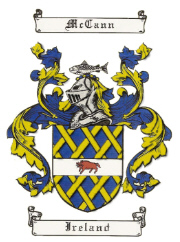The McCann Family Crest

Elements of the McCann Family Crest and their meanings





McCANN families are descendants of the Mac Anna (Mac Annadh) sept which anciently held sway on the southern shore of Lough Neagh, over a territory in the north of the present county Armagh. The McCanns are fairly numerous today in that region and have been dispersed to other parts of Ulster, into Connacht, and southwards into Leinster. The name meant 'the son of the wolf-cub' and they were Lords of Clanbrassel, County Armagh. Ireland was one of the earliest countries to evolve a system of hereditary surnames. They came into being as early as 1000. The tradition of surnames in Ireland developed spontaneously, as the population increased and the former practice, first of single names and then of ephemeral patronymics or agnomina of the nickname type proved insufficiently definitive. At first the surname was formed by prefixing 'Mac' to the father's Christian name or 'O 'to that of a grandfather or earlier ancestor. At first the coat of arms was a practical matter which served a function on the battlefield and in tournaments. With his helmet covering his face, and armour encasing the knight from head to foot, the only means of identification for his followers, was the insignia painted on his shield and embroidered on his surcoat, the flowing and draped garment worn over the armour. The surnames in Ireland originally signified membership of a clan, but with the passage of time, the clan system became less distinct, and surnames came to identify membership of what is called a 'sept'; a group of people all living in the same locality, all bearing the same surname, but not necessarily descended from a common ancestor. Adoption of the name by people who did not otherwise have a surname and by dependents was not uncommon. Just over one hundred years after the Norman Conquest of England, the first Normans arrived in Ireland. Richard de Clare, Second Earl of Pembroke (died 1176), was known as Strongbow. He was invited to Ireland by Dermot MacMurrough, King of Leinster, whose daughter he married, to help him in his wars with his neighbours. He was accompanied by several retainers whose names, like his own, have become well established as surnames in Ireland. The Normans established themselves in Leinster and paid homage to Henry II of England. Some of the Norman settlers acquired surnames derived from the Irish.